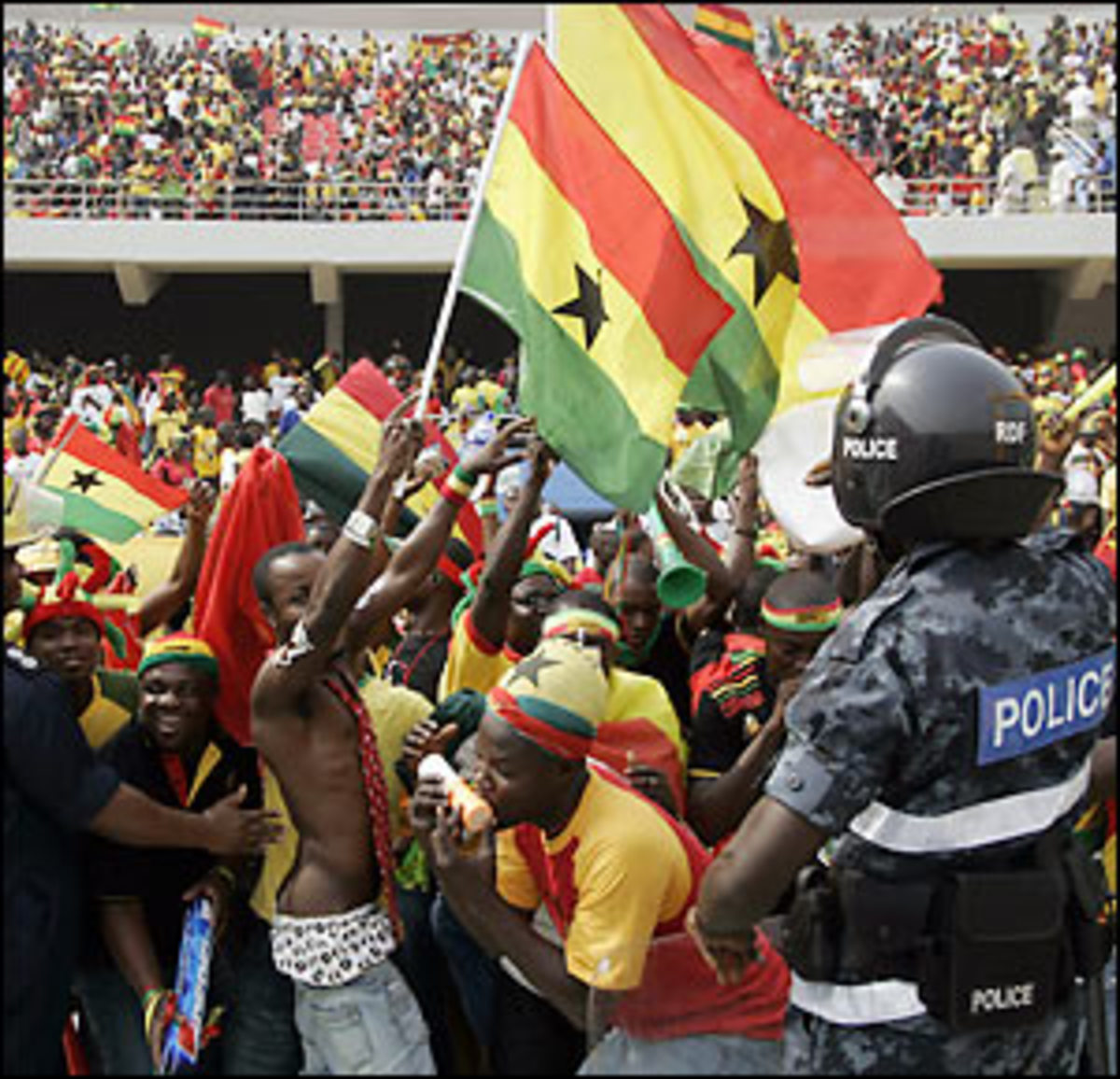Game show hosts
The Ghanaians use this simple interjection to express surprise and worry -- though not necessarily in that order -- and there was so much of surprise and worry on my first day here, I had no choice but to take up the chorus.
However, by most accounts, opening day of the African Cup was a rousing success, a "dream start," as a radio jock put it after Ghana's 2-1 win over Guinea.
And although we journalists had several skirmishes with the woefully disorganized organizing committee (at one point, as I tried to get into the postgame press conference, one young riot policeman slashed his electric-shock baton inches from my chest -- "Oh!"), it would be hard to refute the optimism.
The opening game between Ghana and Guinea was sold out -- 40,000 of the luckiest (read: richest) Ghanaians held tickets, though many times that amount made their way to the stadium area. Years from now, all of them will claim they were at the game, sitting in the VIP section. Everyone wants to be a part of something like this, to touch it, to smell it, to feel they were involved.
It reminded me of a scene in Martin Luther King Jr.'s autobiography, when he wrote about attending Ghana's independence celebrations 50 years ago. MLK arrived in Accra on March 4, 1957, two days before the official day of independence, and later explained in his autobiography, "I wanted to be involved in it, to be a part of it, and notice the birth of this new nation with my own eyes."
In some ways, that's how I feel coming here, because hosting the Cup of Nations is like the rebirth of a nation. "I have never seen so many Ghana flags in my life," my friend and host Alex Acquaah told me as we drove toward the stadium. The streets around Independence Square looked like a flood of red, yellow and green. Flags adorned every car, and street venders swarmed at red lights, hawking T-shirts, noisemakers and big, yellow inflatable hands.
A flatbed truck carrying a full New Orleans-style brass band passed by with a motorcycle police escort. People danced in the streets, while helmeted riot police strutted around like high school bullies. A young guy on a green motorcycle did high-speed wheelies. Whistles and horns blared. At one traffic light, a rail-thin man painted from head to toe in a ghostly white stood in the middle lane like a statue, staring deadly at the drivers and holding up traffic for an eternity.
Inside Ohene Djan Stadium, the stands filled early. Everyone was festooned in the bright national colors, singing and chanting -- and feeling very confident about Ghana's chances this year. In the car, my new friend Ato had predicted a two-nil win for Ghana, with Chelsea star Michael Essien leading the way. "Essien will score one and somebody else will score the other," he said.
The Black Stars were the vibrant upstarts at the 2006 World Cup. They have won the Cup of Nations four times before, but the last one came in 1982. So now, as hosts, the pressure is on. The Group A opener against a tough Guinea side was expected to show if Ghana was up to the task or not.
But before the game, there was the opening ceremony. The hour-long cultural extravaganza proved one thing: The only instrument anyone needs is a drum. Big drums, little drums, "talking" drums, congas -- they all pounded out a constant rhythm impossible to ignore. The dancers on the field -- and, er, in the media section -- smiled and shook like believers at a church revival. Hallelujah!
Finally, the dignitaries were introduced (including Ghanaian president John Kufuor, FIFA boss Sepp Blatter and UEFA don Michel Platini), the speeches were made and the teams took the field. "Any moment now, the kickoff will take place and the battle will begin," the PA announcer told us. And so it did.
I was seated next to a writer from the Casablanca, Morocco, daily Le Matin. Morocco is also in Group A, so he was very interested in this match. We discussed Stephen Appiah's absence from Ghana's midfield, and he pointed out the biggest consequence. "Now there are bigger expectations for Essien," the Moroccan said. "But he cannot do the game by himself."
In fact, Essien didn't seem to want to "do" the game at all. He looked entirely uninterested, as if his mind were on something else (his millions?) and he was only here to satisfy his sponsors. Midway through the first half, his pullout of a 50-50 challenge said it all.
But his teammates picked up the slack, running over Guinea in the first half. The Black Stars struck the post three times in the first half and had a goal called back. Guinea weathered the storm, mainly thanks to luck and the inspired play of Bobo Baldé. The Celtic center back is a monster.
Ghana finally broke through in the second half. Asamoah Gyan soared to win a long ball, and Junior Agogo ran onto the flicked header, carrying the ball into the box. There, he felt a whisper of a touch from a Guinea defender, and flopped. A whooping, pleading "Oh?" went up in the crowd, and the referee blew his whistle. It was the wrong call, but Gyan slotted home the PK easily, 1-0 to Ghana.
The celebrations lasted for a good five minutes. Actually 10. Because that's how long it too for the Syli Nationale to equalize through Oumar Kalabane.
No dream start. One-one simply would not do. The great optimism of the early afternoon looked set to be soured by Guinea until midfielder Sulley Muntari saved the day for his team and his country. Out of nowhere, he unleashed a stunning 30-yard rocket in the 90th minute.
"Oh!" I exclaimed, as the 40,000 Ghanaians around me -- plus the 22 million who didn't get tickets -- exploded with joy.





